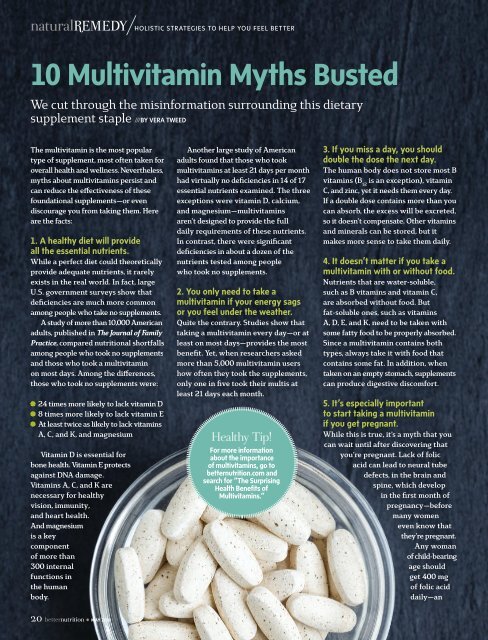Better Nutrition May 2019
Create successful ePaper yourself
Turn your PDF publications into a flip-book with our unique Google optimized e-Paper software.
naturalREMEDY/HOLISTIC STRATEGIES TO HELP YOU FEEL BETTER<br />
10 Multivitamin M yths Busted<br />
We cut through the misinformation surrounding this dietary<br />
supplement staple /// BY VERA TWEED<br />
The multivitamin is the most popular<br />
type of supplement, most often taken for<br />
overall health and wellness. Nevertheless,<br />
myths about multivitamins persist and<br />
can reduce the effectiveness of these<br />
foundational supplements—or even<br />
discourage you from taking them. Here<br />
are the facts:<br />
1. A healthy diet will provide<br />
all the essential nutrients.<br />
While a perfect diet could theoretically<br />
provide adequate nutrients, it rarely<br />
exists in the real world. In fact, large<br />
U.S. government surveys show that<br />
deficiencies are much more common<br />
among people who take no supplements.<br />
A study of more than 10,000 American<br />
adults, published in The Journal of Family<br />
Practice, compared nutritional shortfalls<br />
among people who took no supplements<br />
and those who took a multivitamin<br />
on most days. Among the differences,<br />
those who took no supplements were:<br />
*<br />
*<br />
*<br />
24 times more likely to lack vitamin D<br />
8 times more likely to lack vitamin E<br />
At least twice as likely to lack vitamins<br />
A, C, and K, and magnesium<br />
Vitamin D is essential for<br />
bone health. Vitamin E protects<br />
against DNA damage.<br />
Vitamins A, C, and K are<br />
necessary for healthy<br />
vision, immunity,<br />
and heart health.<br />
And magnesium<br />
is a key<br />
component<br />
of more than<br />
300 internal<br />
functions in<br />
the human<br />
body.<br />
Another large study of American<br />
adults found that those who took<br />
multivitamins at least 21 days per month<br />
had virtually no deficiencies in 14 of 17<br />
essential nutrients examined. The three<br />
exceptions were vitamin D, calcium,<br />
and magnesium—multivitamins<br />
aren’t designed to provide the full<br />
daily requirements of these nutrients.<br />
In contrast, there were significant<br />
deficiencies in about a dozen of the<br />
nutrients tested among people<br />
who took no supplements.<br />
2. You only need to take a<br />
multivitamin if your energy sags<br />
or you feel under the weather.<br />
Quite the contrary. Studies show that<br />
taking a multivitamin every day—or at<br />
least on most days—provides the most<br />
benefit. Yet, when researchers asked<br />
more than 5,000 multivitamin users<br />
how often they took the supplements,<br />
only one in five took their multis at<br />
least 21 days each month.<br />
Healthy Tip!<br />
For more information<br />
about the importance<br />
of multivitamins, go to<br />
betternutrition.com and<br />
search for “The Surprising<br />
Health Benefits of<br />
Multivitamins.”<br />
3. If you miss a day, you should<br />
double the dose the next day.<br />
The human body does not store most B<br />
vitamins (B 12<br />
is an exception), vitamin<br />
C, and zinc, yet it needs them every day.<br />
If a double dose contains more than you<br />
can absorb, the excess will be excreted,<br />
so it doesn’t compensate. Other vitamins<br />
and minerals can be stored, but it<br />
makes more sense to take them daily.<br />
4. It doesn’t matter if you take a<br />
multivitamin with or without food.<br />
Nutrients that are water-soluble,<br />
such as B vitamins and vitamin C,<br />
are absorbed without food. But<br />
fat-soluble ones, such as vitamins<br />
A, D, E, and K, need to be taken with<br />
some fatty food to be properly absorbed.<br />
Since a multivitamin contains both<br />
types, always take it with food that<br />
contains some fat. In addition, when<br />
taken on an empty stomach, supplements<br />
can produce digestive discomfort.<br />
5. It’s especially important<br />
to start taking a multivitamin<br />
if you get pregnant.<br />
While this is true, it’s a myth that you<br />
can wait until after discovering that<br />
you’re pregnant. Lack of folic<br />
acid can lead to neural tube<br />
defects, in the brain and<br />
spine, which develop<br />
in the first month of<br />
pregnancy—before<br />
many women<br />
even know that<br />
they’re pregnant.<br />
Any woman<br />
of child-bearing<br />
age should<br />
get 400 mg<br />
of folic acid<br />
daily—an<br />
20 • MAY <strong>2019</strong>

















